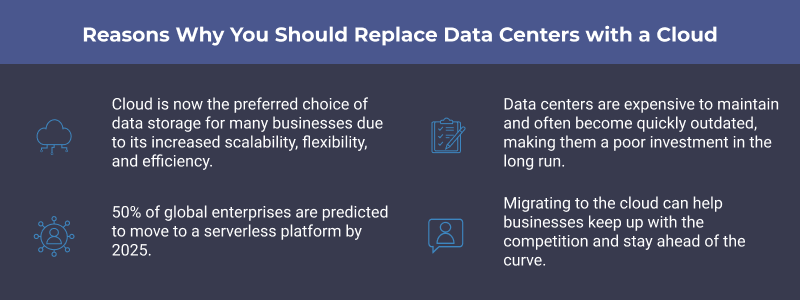Is abandoning your traditional data centers for the cloud worth it? The truth is that switching to cloud services has many advantages, including increased scalability, flexibility, and efficiency. Here are five detailed reasons for replacing data centers with cloud services.

It’s no secret that businesses are currently replacing traditional data centers with the cloud. Gartner predicts that by 2025, more than 50% of global enterprises will have moved to a serverless platform. If you have delayed migration for your own business, you may be asking if it will be worth the investment.
In this blog, we cover five reasons why replacing data centers with the cloud is an excellent strategy. But before that, you should understand the differences between data centers and cloud services.
Data Centers
Data centers are physical facilities used to store data and applications in organizations. They centralize an organization’s IT operations and assets, making data management and protection easier.
But data centers can be expensive – often requiring significant upfront investment, maintenance, and management costs.
Cloud Services
Cloud-based solutions are services delivered over the internet. They are typically offered by third-party vendors, allowing organizations to store and access data and applications over the cloud. Cloud services are more scalable and flexible than traditional data centers and can be purchased on a pay-as-you-go basis.
Cloud services are divided into three categories: Infrastructure as a Service (IaaS), Platform as a Service (PaaS), and Software as a Service (SaaS).
Why Replace Data Centers With a Cloud-Based Solution?
Today, many organizations are replacing their data centers with cloud-based solutions. And the chances are high that you have thought about going serverless, whether you own a company worth multimillions or something smaller. But what is the catch? Here are the top five reasons for replacing data centers with the cloud:
Increased scalability
Scalability is the ability to increase or decrease the capacity of a process or operation. Cloud services are more scalable than traditional data centers, as they can be easily scaled up or down to meet an organization’s changing needs.
For example, if your organization experiences a sudden increase in traffic, you can quickly scale up your cloud service to accommodate the additional demand. Conversely, if your organization experiences a decrease in traffic, you can scale down accordingly. Typically, cloud-based solutions are five times more scalable than on-premises data centers.
Enhanced security
Security is a top priority for organizations of all sizes, and cloud services guarantee required protection. They come with a higher level of security than traditional data centers, ensuring data is safe and secure.
In addition, cloud-based solutions offer several security features not available to traditional data centers. Many cloud-based solutions offer encryption capabilities, which protect your data from unauthorized access. Other security features that you may expect include two-factor authentication and intrusion detection.
Controlled costs
Going serverless is the perfect option for organizations looking to control costs. The money and time needed to set up and run a cloud service are both reasonable. This differs from a typical data center that can cost millions per year to set up and maintain.
In addition, cloud-based solutions often offer a pay-as-you-go pricing model, which can be scaled up or down to suit any budget. This pricing model allows users to pay only for the resources they want to use without being locked into a long-term contract.
Compared to data centers, which require a significant upfront investment, cloud-based solutions offer a more flexible and cost-effective way to meet an organization’s changing needs. A blog post written by Evgeniy Altynpara, a Forbes Councils Member and CEO of Cleveroad, cites an instance where an organization saved 40% on infrastructure costs by converting to cloud services.
Improved performance
Improved performance is one of the critical reasons why you should consider replacing your data centers with a cloud. You can realize this in the following ways.
- Faster Deployment: Cloud-based solutions can be deployed much faster than traditional data center solutions. You won’t have to wait for the hardware to be delivered and set up to start operations.
- Lower Latency: Your data is stored in the cloud, meaning you can access a high volume of data with minimal delay. Traditional data centers cannot match this level of speed since it must be accessed physically.
- Better Disaster Recovery: Cloud-based solutions provide several disaster recovery features, such as snapshotting and replication. This will ensure that your data is always safe and secure.
Enhanced business agility
Business agility has become a major differentiator in the marketplace. Companies that can quickly adapt to changing market conditions and customer needs are the most successful. Compared to data centers, early-stage migration to the cloud enables enterprises to be more agile in the following ways.
- Adapting to changing business conditions quickly: The cloud allows businesses to scale up or down to meet changing needs dynamically. This is in contrast to data centers, which often have capacity that goes unused during slow periods.
- Easily integrating new applications and services: The cloud makes it easy to integrate new applications and services into your existing infrastructure. You don’t have to provision new hardware or install new software.
- Optimizing IT budgets: Cloud computing ensures you only pay for the specific resources you need, helping you optimize your IT budget and save money.
- Faster time to market: The cloud enables you to quickly deploy new applications and services. This can help you to get your products and services to market faster than your competitors.
Get Expert Help to Migrate To the Cloud
CloudHesive is a leading B2B provider of cloud computing solutions and consultancy services. Our commitment is to assist organizations of all sizes in migrating their data centers to the cloud. We understand that this process can be challenging and stressful – but it doesn’t have to with our professionals on standby to assist.
Learn more about how we can help you migrate to the cloud and get ahead of the competition today.



